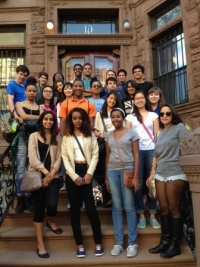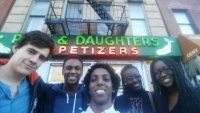The CJS begins with a deceptively simple question: what is a journey? How can we collectively and individually embrace the detours, setbacks, surprises, and growth that come with pursuing a goal and engaging with different points of view? And, perhaps most importantly for this seminar, what might a journey at Columbia look like – personally, professionally, and in relation to the broader community?
The goal of the CUSP Columbia Journey Seminar (CJS) is to foster an environment in which first-year Scholars can feel empowered to explore their individual interests alongside the needs and opportunities of Columbia’s academic and social communities. We explore the living histories of Columbia, the immediate Columbia neighborhood (Morningside Heights and Harlem), and the greater world of New York City. Our weekly CJS seminar introduces Scholars to principles of intellectual inquiry, academic discussion, and social engagement by providing a space to discover and explore key resources in the university and city.
Alongside engagements with critical topics such as immigration and gentrification, our seminar intertwines classroom discussion with CUSP ‘field trips’ like the mandatory tour of Harlem at the beginning of the fall semester. Students have described this tour as vital to understanding the “cultural preservation and community pride” that drives Harlem and New York City (a comment from a John Jay Scholar). This experience helps students enrich their perceptions of the community surrounding Columbia: “I loved seeing the places that were occupied by some of the world's greatest African American men and women and walking the streets they protested on” (from a Kluge Scholar).
This program brings First-Year Scholars together with Graduate Student Mentors (GSMs) completing their PhDs in different fields – reflecting the diversity of scholarship and intellectual engagement at Columbia – as well as faculty, administrators, and representatives from the community.
Though the CJS curriculum covers the entire academic year, the emphasis of the discussions will differ slightly in terms of overarching themes between the fall and spring semesters. The fall semester curriculum, which introduces students to the program, is designed to emphasize the culture, history, and social dynamics of New York City. Scholars will have the opportunity to go on expeditions to notable sites in the city and reflect on them in relation to broader themes such as the politics of memory and representation, histories of immigration, and the development of the city’s urban infrastructure.
The spring semester offers students the opportunity to build on these discussions by placing Columbia University within the social dynamics of the city, both historical and contemporary. We begin with a discussion of both the 1968 protests at Columbia and what it means to be a Columbian in light of this history, and indeed, how these concerns and issues remain applicable today. From there, we move to an exploration of archival resources on campus and provide practical tools and resources for students to navigate the academic world of networking, mentorship-seeking, and time management.
The CJS offers something rare: a non-graded, no-credit learning opportunity at the heart of our vibrant intellectual community. Freed from the pressure of grades, students can focus their full energy and spirit of inquiry on the resources, artistic riches, and histories of Columbia and New York City while building connection with their classmates. Some students have even wished for an additional year of CJS!
Attendance: Every Scholar must sign up for one CJS section that meets for one hour weekly, eight times per semester.
From the Graduate Student Mentors:
In many ways, the CJS extends the ethos of the Core. All of the first-year scholars read about and critically engage with an important set of issues relating to community, focusing on the New York and Columbia communities in the fall and spring, respectively.
The pedagogical principles around which the syllabus is constructed share much in common with the Core Curriculum: it is based on readings of broad cultural significance which students are encouraged to use in developing and understanding a richer conception of their personal identities and values, and classes prioritize student discussion over lectures.
The CJS functions as a very useful way to introduce students to the world of college discussion in general. It is a place where students can practice communication with their peers and with people in instructor-positions in a low-stakes environment, where students can air their views to a community of scholars who are willing to help them sift through and determine those views without judgment.
By offering weekly sessions devoted to considering social, historical, and political questions specific to New York City and Columbia, CJS offers its Scholars a way to escape the “ivory tower” through a consideration of the relationship between academic knowledge and the city we live in, and how the former can be used to transform the latter.

